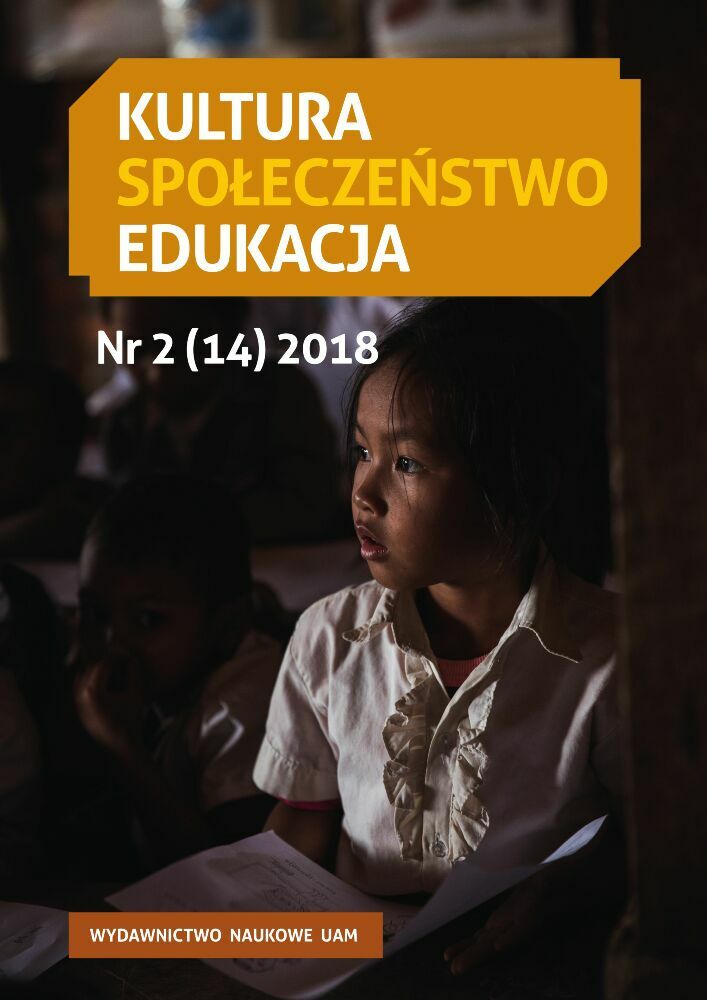Abstract
Nowosad Inetta, Społeczno-kulturowe uwarunkowania demokratyzacji edukacji na Tajwanie [Social and cultural preconditions for the process of democratization in Taiwanese education]. Kultura – Społeczeństwo – Edukacja nr 2(14) 2018, Poznań 2018, pp. 137–154, Adam Mickiewicz University Press. ISSN 2300-0422. DOI 10.14746/kse.2018.14.12.
The article focuses on changes introduced in Taiwan’s education since 1949, which reflect the social changes taking place in this country. Special attention is drawn to the origin and the course of two particularly important processes, i.e. democratisation and taiwanisation, which have radically changed the face of education, revealing Taiwan’s ‘balancing’ between the East and the West. While depicting their essence, also complex links with Taiwan’s policies towards China and its orientation onto economic growth were taken into account.
References
Chen P. (2008). Strategic leadership and school reform in Taiwan. “School Effectiveness and School Improvement” vol. 19, nr 3, s. 293–318.
Cheng T. (1993). Learning to Read in Chinese First Grade Classrooms (ERIC Document Reproduction Service No. ED 362 581).
Cheng-sheng T. (2007). Taiwan’s Educational Reform and the Future of Taiwan, Minister of Education, Taiwan and Member of the Academia Sinica, Taipei Presented at London School of Economics and Political Science January 10, 2007. http://www.lse.ac.uk/researchAndExpertise/units/TaiwanProgramme/Events/PublicLectures/TaiwanEducationalReform_English.pdf dostęp: 20.12.2017.
Clark N. (2010). Education in Taiwan. “World Education News & Reviews” https://wenr.wes.org/2010/05/wenr-may-2010-feature, dostęp: 20.12.2017.
Copper J.F. (2013). Taiwan. Nation-State or Province? Wyd. VI. Boulder, CO.
Domes J. (1981). Political differentiation in Taiwan: group formation within the Ruling Party and till Opposition Circles 1979–80. „Asian Survey”, nr 10, s. 1011–1028.
Doong S. (2008). Taiwan’s new citizenship curriculum: Changes and challenges. [w:] D.L. Grossman,
W.O. Lee, K.J. Kennedy (eds). Citizenship curriculum in Asia and the Pacific. Hong Kong, s. 43–60.
Education in Taiwan, [w:] World Education News & Reviews. https://wenr.wes.org/2010/05/wenr-may-2010-feature, dostęp: 20.12. 2017.
Gold T.B. (1986). State and Society in the Taiwan Miracle. Sharpe: N.Y.
Ho H.-Z., Lam Y.W. Yeh K.-H. (2013). Character education in Taiwan: A reflection of historical shifts in sociocultural contexts. “Childhood Education” vol. 89, s. 362–367.
Hung T.-Y. (2007). American new character education movement and its implication for grade 1-9 curriculum in Taiwan. “School Administration Bi-monthly” nr 48, s. 300–314.
Ka-Lok Chan K. (1996). Państwo autorytarne a tajwański cud gospodarczy. „Studia Polityczne” nr 5, s. 117–126.
Law W.-W. (2002). Education reform in Taiwan: A search for a ‘national’ identity through democratisation and Taiwanisation. “Compare: A Journal of Comparative and International Education” vol. 32, s. 61–81.
Lee C.-M. (2004). Changes and challenges for moral education in Taiwan. “Journal of Moral Education” nr 33(4), s. 575–595.
Lee C.-M. (2009). The planning, implementation, and evaluation of a character-based school culture project in Taiwan. “Journal of Moral Education” nr 38(2), s. 165–184.
Lee C.-M. (2012). Moral and character education in Taiwan: History and lessons to be drawn. Referat opracowany na: The Jubilee Centre for Character and Values, Character and Public Policy: Educating for an Ethical Life, University of Birmingham, United Kingdom.
Liu C. (1958). A Report on Education to the Provincial Assembly. Department of Education, Taiwan Provincial Government: Taiwan.
Liu C. (1977). Education is Dedication. Taipei, Taiwan.
Liu M. (2002). Civic education at the crossroads. [W:] J.J. Cogan, P. Morris, M. Print (eds). Civic Education in the Asia-Pacific Region. New York, NY, s. 93–117.
McKnight A. (1994). Chinese learners of English: A different view of literacy? “Open Letter” nr 4 (2), s. 39–52.
Meyer J.F. (1988). Moral education in Taiwan. “Comparative Education Review” nr 32(1), s. 20–38.
Ministry of Education Republic of China, Education in Taiwan, Department of Statistics, Taipei 2013/2014, s. 8-10. https://stats.moe.gov.tw/files/ebook/Education_in_Taiwan/2013-2014_
Education_in_Taiwan.pdf, dostęp: 20.12.2017.
Murphy C., Liu M. (1998). Choices must be made. The case of education in Taiwan. “Education” nr 3(13), s. 9–16.
Pan H.-L. (2007). School effectiveness and improvement in Taiwan. [W:] T. Townsend (ed.). International Handbook of School Effectiveness and Improvement. Dordrecht.
Sedlak P. (1983). An evaluation of EFL methodology in the R.O.C. [W:] C. Feng-Pu (ed.) EFL Readings for Chinese Teachers. Taipei, s. 413–417.
Smith D. (1992). The Chinese family in transition: implications for education and society in modern Taiwan’, Paper presented at the Comparative Education Association/World Bank Seminar, Annapolis, Maryland (ERIC Document Reproduction Service No. ED 352 295).
Song X. (2009). Between Civic and Ethnic The Transformation of Taiwanese Nationalist Ideologies (1895–2000). Brussels.
Sprenger A. (1991). Higher moral education in Taiwan. [W:] T. Van Doan, V. Shen, G.F. McLean (eds). Chinese Foundations for Moral Education and Character Development. Washington, DC, s. 155–176.
Suleski R.S. (2005). The Fairbank Center for East Asian Research at Harvard University: a Fifty Year History, 1955–2005. Cambridge.
Tai H.C. (1970). The Kuomintang and modernization in Taiwan. [W:] S.P. Huntington, C.H. Moore (eds). Authoritarian Politics in Modern Society. New York.
Weber M. (1968). The Religion of China: Confucianism and Taoism. New York.
Weber M. (2010). Etyka protestancka a duch kapitalizmu. Warszawa.
Weiner M. (1966), Political participation and political development. [W:] M. Weiner (ed.), Modernization: The Dynamics of Growth, Washington, D.C., s. 228–231.
Winckler E.A. (1984). Institutionalization and participation on Taiwan: From hard to soft authoritarian? “China Quarterly” s. 481–499.
Wu-Ping K. (2007), Wpływ stosunków chińsko-tajwańskich na rozwój gospodarczy Tajwanu. „Studia i Materiały” nr 2, s. 104–109.
Yao Z. (2000). An Introduction to Confucianism. Cambridge.
Young Y.R. (1995). Taiwan. [W:] P. Morris, A. Sweeting (eds). Education and Development in East Asia. New York, s. 105–124.
License
Copyright (c) 2018 Inetta Nowosad

This work is licensed under a Creative Commons Attribution-NoDerivatives 4.0 International License.
